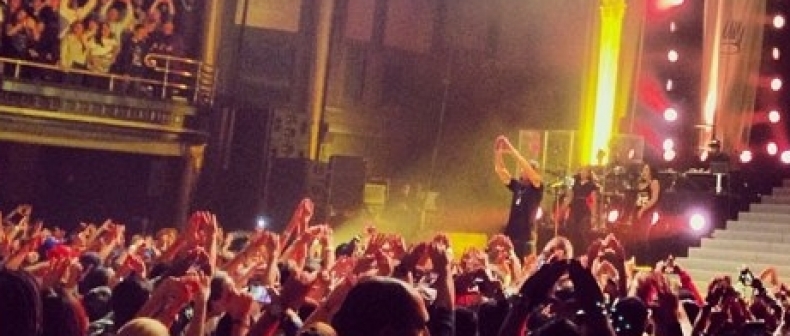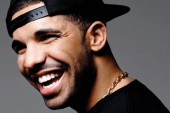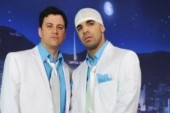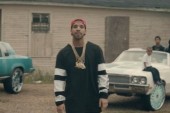
After performing his second song on Tuesday night, international rap star J. Cole, revealed himself in typically Coleian fashion. “Don’t think I don’t see you up top,” he said, gazing into the upper-deck of Toronto’s Massey Hall. “The furthest nigga at the top: I see you. I don’t do a lot of talking during the show, I just wanted you to know that I see you.”
Nevermind that he did do a lot of talking during the show, or that he could have lopped off a sentence to increase maximum dramatic effect–the earnest proclamation is a partial portal into how the 28-year-old, Fayetteville, North Carolina native was able to led an eager and broad swath of Toronto to a hasty sellout of one of its most historic theatres. Six years into his career, the thoughtful and laborious MC has firmly established himself as one of the leaders of rap’s new school–Internet hypebeast sensation turned crossover radio star. After the release of his debut tape, The Come Up, in 2007, boom-bap boosters began noisily anointing Cole as one of the genre’s saviors–a rapper whose stylistic lineage to rap’s 90s golden era and crossover appeal as millennial rap everyman could make him a once-in-a-generation talent. Though Cole hasn’t quite achieved those quixotic heights yet, he is indisputably a major star: two albums in, 2 Billboard #1 spots.
The What Dreams May Come stage show came with a dramatic narrative arc–one centered on a life-threatening car crash that leaves Cole in a coma, expressed to us by a news reporter on a big screen behind the elaborate stage. While Cole’s fictional story is one that has infamously been told before, the allusion set the tone for the reflective and frequently self-lacerating songs that dot Cole’s catalog.
Backed by a three-piece band and DJ, clad in a black t-shirt and jeans, Jesus piece and glistening watch and backwards cap, Cole took his starring role with cheesy aplomb. “Tonight is when you feel on top of the world…and you feel like it’s tumbling down,” he said before sprightly launching into “Blow Up,” a highlight from his excellent 2010 mixtape, Friday Night Lights. Cole’s experience as a seasoned road dog performing to sold out crowds was evident, he calmly and confidently stalked each side of the stage, straining his voice to raise over the boisterous strains of his live band and punctuating the bridge of his each verses by imploring fans to keep up.
“Every motherfucker in this building sold this out in less than five minutes, I think that makes us friends,” Cole said moments later, introducing “Work Out,” the bubblegum Kanye West-sampling platinum single that helped propel Cole World: The Sideline Story to number one on the Billboard Chart (and earned Cole censure from Nas). “And because we are friends, I can tell you about how a nigga really feels: I drank a lot of Hennessey tonight. And when I drink Hen, I be trying to go home and hmm something,” he continued, muffling the obvious expletive before launching one of the night’s most passionate sing along moments. The moment was quintessentially Cole–even his coarse, stereotypical rapper sexual boasts are presented with a lacquer of politeness.
Cole ran through two interludes from his most recent album, Born Sinner, with the same agreeable demeanour and humdrum confidence that gives credence to detractors who decry his lack of “it” factor as the reason Cole has been a disappointment, but it did not affect the nearly 3,000 in attendance, who hung on his every word as he ran through cuts the gold-selling album. By the time Cole performed “Forbidden Fruit,” a track from Born Sinner that interpolates A Tribe Called Quest’s “Electric Relaxation,” and features Kendrick Lamar, he had hit his stride. While on Born Sinner the track crumbles under the pressure and weight of the original, Cole’s sincere performance and the crowd’s impassioned response gave the song an edge missing on the album.
It was a moment that illustrated how the very humbleness and fervent hero-worship that gives legs to criticisms of Cole on records are actually the same qualities that make him beguilingly relatable on stage.
Later in the show, before Cole kicked off “Lights Please,” the song that reportedly initially caught the ear of Jay Z (and eventually leading Cole’s Roc Nation deal), to his Cole animatedly demanded that anyone in the crowd who knew the lyrics should scream them as loud as possible. “If you don’t know the song, sit down and be quiet. I’ll play Power Trip in a minute,” he said to those that didn’t. The line elicited a laugh from many in the crowd–including those who didn’t know the words to “Lights, Please,” of course. Cole does not do venom convincingly.
This, at times, can cause Cole to come off smarmy and ineffectual. And is a large part of why Cole’s two studio albums fell short of the generation defining masterpieces many expected him to make. While Drake and Kendrick Lamar were able to use their most recent albums to carve distinct aesthetic and narrative arcs that keep them atop their “rap voice of a generation” game, Cole lags a half-step behind.
Still, none of that mattered on Tuesday night. Large portions of the show leaned on Cole’s charisma to carry the evening’s story through banter or rhetorical call and response moments that occasionally felt unctuous–like the “cool” substitute teacher playing a racy movie in class but still being unable to transcend his transparent obsequiousness–but the Massey Hall crowd dutifully played along, laughing where they were supposed to and many riding the emotional rollercoasters of Cole’s verses on songs like “Villuminati” and “Kenny Lofton.”
Cole saved his best for last–the closing 1-2 punch of “Crooked Smile” and “Power Trip,” casting him alternatively as sensitive and insightful, sly and Lothario like.
Yes, these qualities without otherworldly charisma and outsized confidence do not a superstar make, but Cole wore the superstar reaction Massey Hall gave him well, particularly at the end of the “Power Trip.” With Miguel’s stirring hook ringing through rafters, Cole leaned back on one foot, letting his arms swing as though he were conducting an orchestra, a toothy grin on his face, finally exuding the carefree levity he aimed for all show.
Rap has long gone the way of pop culture by giving up on any aspirations of reaching the focused heights of its previously monolithic culture. There will be no genre “savior.” And that’s okay–the industry and the way it charts success has adapted to the way we consume music. It’s clear that part of the reason Mr. Nice Watch hasn’t been able to take the rap messiah crown is because he is really Mr. Nice Guy. And that’s okay, too.
____
Jordan Sowunmi is a freelance writer in Toronto. Follow him on Twitter @JordanIsJoSo
For more, follow us on Twitter at @torontostandard, and subscribe to our newsletter.














